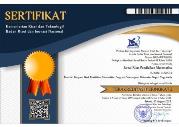Pengembangan perangkat pembelajaran bangun ruang di SMP dengan pendekatan pendidikan matematika realistik
DOI:
https://doi.org/10.21831/jrpm.v3i1.10407Keywords:
pengembangan, perangkat pembelajaran, pendekatan pendidikan matematika realistik, bangun ruang SMPAbstract
Penelitian ini bertujuan untuk menghasilkan produk berupa perangkat pembelajaran bangun ruang SMP dengan pendekatan pendidikan matematika realistik yang valid, praktis, dan efektif ditinjau dari ketercapaian kompetensi dasar, kemampuan koneksi matematis, dan minat terhadap matematika. Jenis penelitian adalah penelitian pengembangan menggunakan model 4-D yang terdiri atas empat tahap yaitu tahap pendefinisian, perancangan, pengembangan, dan tahap penyebaran. Hasil penelitian berupa perangkat pembelajaran bangun ruang yang terdiri dari silabus, RPP, LKS, dan tes hasil belajar berupa tes ketercapaian kompetensi dasar (TKKD) dan tes kemampuan koneksi matematis (TKKM) yang valid, praktis, dan efektif. Kevalidan perangkat mencapai kategori sangat baik ditinjau dari penilaian ahli. Kepraktisan perangkat mencapai kategori sangat baik ditinjau dari penilaian guru, penilaian siswa, dan observasi keterlaksanaan pembelajaran. Aspek keefektifan dipenuhi dari tercapainya minimal 80% siswa lulus KKM ditinjau dari ketercapaian kompetensi dasar dan kemampuan koneksi matematis, serta lebih dari 80% siswa mempunyai minat terhadap matematika dalam kategori minimal baik.
Kata Kunci: pengembangan, perangkat pembelajaran, pendekatan pendidikan matematika realistik, bangun ruang SMP
Developing Space Learning Kit in Junior High School with Realistic Mathematics Education Approach
Abstract
This research aimed to produce space learning kits with realistic mathematics education approach in Junior High School which valid, practical, and effective viewed from achievement of basic competence, mathematical connection ability, and mathematics interest. This research was development research used 4-D model that consisted of four phases: defining, designing, developing, and disseminating. This research produced space learning kit that consisted of syllabus, lesson plans, students' worksheets, and assessment tests that included test of basic competence achievement and mathematical connection test which valid, practical, and effective. The validity of learning kit get very good category from expert assessment. The practicallity of learning kit get very good category from teachers assessment, students assessment, and observation of learning implementation. The aspect of effectiveness was seen from achievement minimum 80% of the student pass the minimum score for achievement of basic competence and mathematical connection skill, and more than 80% of student have mathematics interest in least good category.
Keywords: development, learning kit, realistic mathematics education, spaceReferences
Azwar, S. 2009. Tes prestasi. Yogyakarta: Pustaka Pelajar.
Cowan, P. (2006). Teaching mathematics: A handbook for primary and secondary school teachers. New York: Routledge.
Danubroto, S. W. (2007). Pengaruh pembelajaran matematika dengan pendekatan pendidikan matematika realistik indonesia dan pelatihan metakognitif terhadap kemampuan pemecahan masalah siswa sekolah dasar. Tesis magister, tidak diterbitkan, Universitas Negeri Yogyakarta, Yogyakarta.
Elliot, S. N., Kratochwill, R. T., Cook, L. J., et.al. (2000). Educational psychology: effective teaching, effective learning. New York: The Mc Graw-Hill Companies.
Fauzan, A. (2002). Applying realistic mathematics education (RME) in teaching geometry in Indonesian primary schools. Tesis master, tidak diterbitkan, University of Twente, Netherlands.
Frenzel, A. C., Goetz, T., Watt, H. M. G., et.al. (2010). Development of mathematics interest in adolescence: influences of gender, family, and school context. Journal of Research on Adolescence, 20(2), 507-537. Retrive from:http://users.monash. edu.au/~hwatt/articles/Frenzel_etal_JRA2010.pdf. Diambil pada tanggal 20 Januari 2014.
Gravemeijer, K. P. E. (1994). Developing realistic mathematics education. Utrecht: CD-β Press
Hadi, S. (2005). Pendidikan matematika realistik dan implementasinya. Banjarmasin: Tulip.
Jihad, A. 2008. Pengembangan kurikulum matematika (tinjauan teoritis dan historis). Bandung: Multi pressindo.
Kemp, J. E. Morrion, G. R. & Ross, S. M. (1994). Design effective instruction. New York: Macmillan College Publishing Company.
Kennedy, L. M., Tipps, S., & Johnson, A. (2008). Guiding children's learning of mathematics (11thed.). New York: Thomson Wadsworth.
Mendiknas. (2006). Peraturan Menteri Pendidikan Nasional RI Nomor 22 Tahun 2006 tentang Standar Isi untuk Satuan Pendidikan Dasar dan Menengah.
Mendiknas. (2007). Peraturan Menteri Pendidikan Nasional RI Nomor 41 Tahun 2007 tentang Standar Proses untuk Satuan Pendidikan Dasar dan Menengah.
Mitchell, M. & Gilson, J. (1997). Interest and anxiety in mathematics. Paper presented at the annual meeting of the American Research Association, Chicago. (ERIC Document Reproduction Service No. ED 412116)
National Council of Teachers of Mathematics. (2000). Principles and standarts for school mathematics. Reston, VA: NCTM.
Nitko, A. J., & Brookhart, S. M. (2011). Educational assesment of student (6th ed). Boston, MA: Pearson.
Nugraheni, E., & Sugiman, S. (2013). Pengaruh pendekatan PMRI terhadap aktivitas dan pemahaman konsep matematika siswa SMP. PYTHAGORAS: Jurnal Pendidikan Matematika, 8(1), 101–108. doi:http://dx.doi.org/10.21831/pg.v8i1.8498
OECD. (2013). PISA 2012 results in focus: what 15-year-olds know and what they can do with what they know. Paris: OECD.
Pramudiani, P. et al. (2011). A Concrete Situation for Learning Decimals. IndoMS Journal of Mathematics Education, 2(2), 215-230.
Schunk, D. H., Pintrich, P. L. & Meece, J. L. (2010). Motivation in education: theory, research, and applications. London: Pearson Education Internasional.
Sembiring, R. K. (2010). Pendidikan Matematika Realistik Indonesia (PMRI): Perkembangan dan tantangannya. IndoMS Journal Of Mathematics Education, 1(1), 11-16.
Sugiman & Kusumah, Y. S. (2010). Dampak pendidikan matematika realistik terhadap peningkatan kemampuan pemecahan masalah matematik siswa SMP. IndoMS Journal of Mathematics Education, 1(1), 41-45.
Thiagarajan S., Semmel D., & Semmel M. I. (1974). Instructional development for training teachers of exceptional children : a sourcebook. Minneapolis, MA: Central for Innovation on Teaching the Handicaped.
Wardhani, S & Rumiati. (2011). Instrumen penilaian hasil belajar matematika SMP: belajar dari PISA dan TIMSS. Yogyakarta: PPPPTK Matematika.
Westwood, P. (2008). Learning and learning difficulties: A handbook for teacher. Camberwell, VA: Acer Press.
Woolfolk, A. (2007). Educational psychology. Boston, MA: Pearson Education.
Zaini, A., & Marsigit, M. (2014). Perbandingan keefektifan pembelajaran matematika dengan pendekatan matematika realistik dan konvensional ditinjau dari kemampuan penalaran dan komunikasi matematik siswa. Jurnal Riset Pendidikan Matematika, 1(2), 152-163. doi:http://dx.doi.org/10.21831/jrpm.v1i2.2672
Zulkardi. (2002). Developing a learning environmenton realistic mathematics education for Indonesian student teachers. Tesis master, tidak diterbitkan, University of Twente, Netherlands.
Downloads
Published
How to Cite
Issue
Section
License

Jurnal Riset Pendidikan Matematika by http://journal.uny.ac.id/index.php/jrpm/index is licensed under a Creative Commons Attribution-ShareAlike 4.0 International License.









